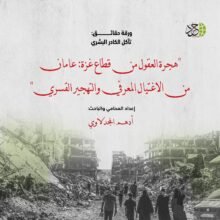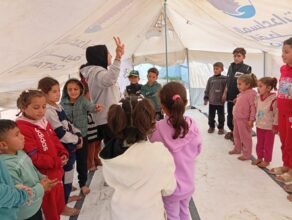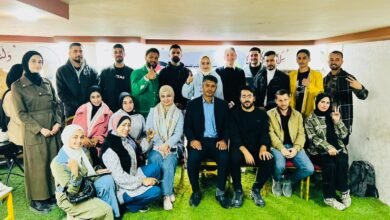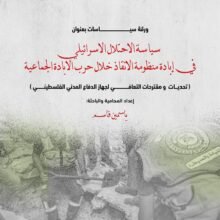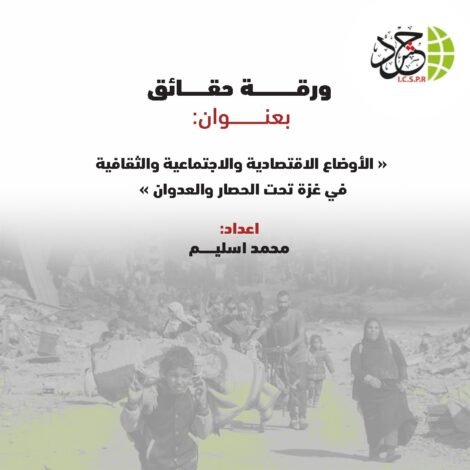
“ICSPR” Issues Fact Sheet Revealing the Catastrophic Economic, Social, and Cultural Conditions in Gaza Under Siege and Aggression
Date: September 20, 2025
Press Release
“ICSPR” Issues Fact Sheet Revealing the Catastrophic Economic, Social, and Cultural Conditions in Gaza Under Siege and Aggression
The International Commission to Support Palestinian Rights (ICSPR) has issued a comprehensive fact sheet, prepared by Mohamed Aslim, highlighting the humanitarian and living conditions in the Gaza Strip during 2025, amid the ongoing Israeli siege since 2007 and repeated military aggression. The report documents, through data and analysis, the scale of the economic, social, and cultural crisis affecting over two million Palestinians in the territory, under conditions that threaten their lives, dignity, and right to development and a decent standard of living.
The report confirms that Gaza’s economy is experiencing an unprecedented structural collapse, with unemployment rising to 85% among the workforce and approximately 73% of households living below the poverty line. Over 80% of the population relies on humanitarian aid, mostly food assistance, to meet basic needs.
The report indicates that the average daily income per person has dropped to less than $3, while 70% of the population suffers from food insecurity due to weakened purchasing power and disrupted supply chains. The recent aggression resulted in the destruction or closure of around 42,000 economic establishments, leading to the loss of more than 150,000 jobs, with youth unemployment particularly affected.
The electricity crisis and power outages, coupled with restrictions on the entry of fuel, construction materials, and raw materials, caused local production to decline by over 40% compared to pre-aggression levels, in an extremely fragile economic environment that leaves no room for recovery or development.
Gaza’s social fabric is also collapsing, with more than two million people internally displaced—approximately 80% of the population—while tens of thousands live in temporary shelters lacking basic humanitarian conditions.
The aggression has resulted in over 90,000 fatalities, including a significant number of women and children, and around 210,000 injuries, including tens of thousands of permanent disabilities. Gaza’s healthcare system is on the brink of collapse, with more than 1,500 doctors and medical staff killed or injured during the aggression, and severe shortages of medicines and medical supplies.
In education, approximately 95% of schools and universities have been destroyed or partially damaged, depriving hundreds of thousands of students of their right to education, while 90% of children suffer from psychological disorders due to ongoing bombardment and repeated displacement.
Cultural and artistic life in Gaza has also suffered extensive damage. The aggression affected more than 208 cultural and educational sites, including public libraries, small museums, heritage centers, and art halls, while over 80% of cultural and community centers were impacted, causing an almost complete paralysis of cultural and artistic activities.
In higher education, around 785,000 university students were deprived of continuing their studies due to the destruction or disruption of more than 388 universities and colleges. Palestinian cultural heritage has been systematically attacked, with the destruction of cultural assets and historical sites reflecting a policy aimed at erasing national identity and depriving future generations of their cultural legacy.
Despite these tragic circumstances, individual and collective initiatives by intellectuals and artists have emerged to document the Palestinian experience through literature, digital art, and alternative media, in an effort to preserve national memory and resist cultural erasure.
ICSPR emphasizes that Gaza is experiencing a compounded humanitarian disaster, encompassing the collapse of economic, social, and cultural life, and that the ongoing siege and aggression constitute a clear human rights violation.
The commission calls on the international community to take urgent action and recommends the following:
-
Apply serious pressure on Israel to halt the aggression and lift the siege immediately.
-
Support urgent reconstruction programs and humanitarian assistance, ensuring safe delivery to the population.
-
Empower local civil society organizations to document and defend basic rights.
-
Mobilize Arab and regional support to strengthen the resilience of Palestinian civilians and protect their lives and identity.


